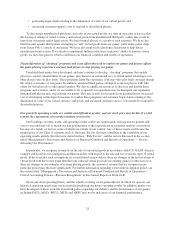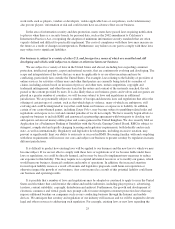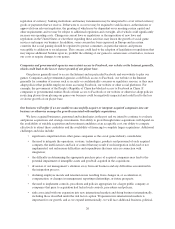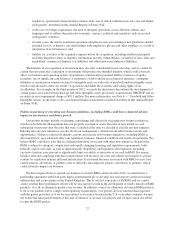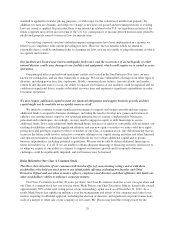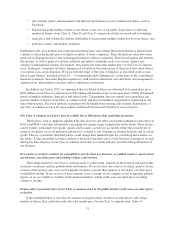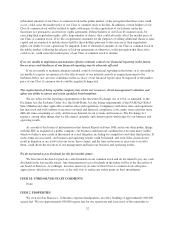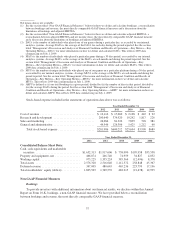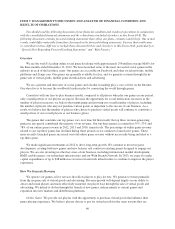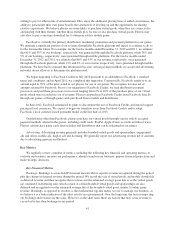Zynga 2012 Annual Report Download - page 39
Download and view the complete annual report
Please find page 39 of the 2012 Zynga annual report below. You can navigate through the pages in the report by either clicking on the pages listed below, or by using the keyword search tool below to find specific information within the annual report.• the activities, public announcements and financial performance of our commercial partners, such as
Facebook;
• fluctuations in the trading volume of our shares, or the size of our public float relative to the total
number of shares of our Class A, Class B and Class C common stock that are issued and outstanding;
• share price and volume fluctuations attributable to inconsistent trading volume levels of our shares; and
• general economic and market conditions.
Furthermore, the stock markets have experienced extreme price and volume fluctuations that have affected and
continue to affect the market prices of equity securities of many companies. These fluctuations often have been
unrelated or disproportionate to the operating performance of those companies. These broad market and industry
fluctuations, as well as general economic, political and market conditions such as recessions, interest rate
changes or international currency fluctuations, may negatively impact the market price of our Class A common
stock. In the past, companies that have experienced volatility in the market price of their stock have been subject
to securities class action litigation. We have been the target of this type of litigation as described in the section
titled “Legal Matters’ included in Note 13 —“Commitments and Contingencies” in the notes to the consolidated
financial statements. Securities litigation against us could result in substantial costs and divert our management’s
attention from other business concerns, which could harm our business.
In addition, in October 2012, we announced that our Board of Directors authorized us to repurchase up to
$200 million of our Class A common stock. The timing and amount of any stock repurchases will be determined
based on market conditions, share price and other factors. The program does not require us to repurchase any
specific number of shares of our Class A common stock, and may be modified, suspended or terminated at any
time without notice. The stock repurchase program will be funded from existing cash on hand. Repurchases of
our Class A common stock in the open market could result in increased volatility in our stock price.
Our Class A common stock price may be volatile due to third-party data regarding our games.
Third parties, such as AppData, publish daily data about us and other social game companies with respect to
DAUs and MAUs and other information concerning social game usage, in particular on Facebook. These metrics
can be volatile, particularly for specific games, and in many cases do not accurately reflect the actual levels of
usage of our games across all platforms and may not correlate to our bookings or revenue from the sale of virtual
goods. There is a possibility that third parties could change their methodologies for calculating these metrics in
the future. To the extent that securities analysts or investors base their views of our business or prospects on such
third-party data, the price of our Class A common stock may be volatile and may not reflect the performance of
our business.
If securities or industry analysts do not publish research about our business, or publish negative reports about
our business, our share price and trading volume could decline.
The trading market for our Class A common stock, to some extent, depends on the research and reports that
securities or industry analysts publish about our business. We do not have any control over these analysts. If one
or more of the analysts who cover us downgrade our shares or lower their opinion of our shares, our share price
would likely decline. If one or more of these analysts cease coverage of our company or fail to regularly publish
reports on us, we could lose visibility in the financial markets, which could cause our share price or trading
volume to decline.
Future sales or potential sales of our Class A common stock in the public market could cause our share price
to decline.
If the existing holders of our Class B common stock particularly our directors and officers, sell a large
number of shares, they could adversely affect the market price for our Class A common stock. Sales of
31


